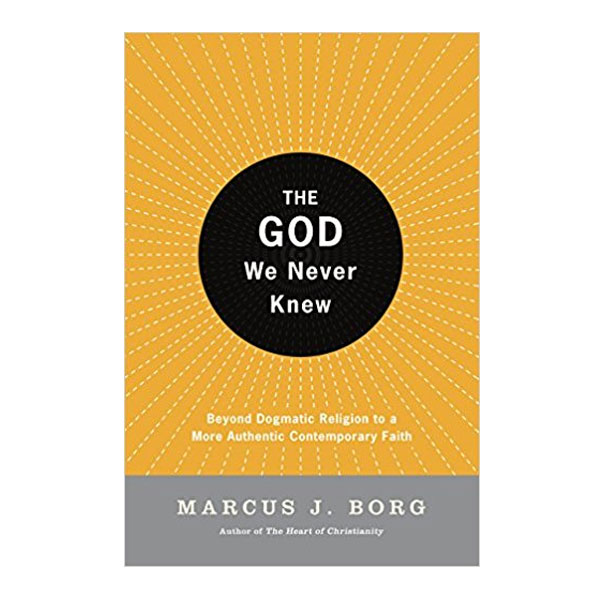Where to buy this book
Beyond Dogmatic Religion to a More Authentic Contemporary Faith
How to have faith – or even think about God – without having to stifle modern rational thought is one of the most vital challenges facing many of us today.
Marcus J. Borg, author of the bestselling Meeting Jesus Again for the First Time, traces his personal spiritual journey to the discovery of an authentic yet fully contemporary understanding of God. In a compelling, readable way, he leads us from the distant, authoritarian God of our childhood to an equally powerful, dynamic adult image of God – “the beyond in our midst,” the life spirit that is within us and all around us – that reconciles faith with science, history, critical thinking, and religious pluralism.
Exploring Progressive Christianity
Marcus J. Borgs’ The God We Never Knew examines what belief means in this day and age. This book questions traditional Christianity and how traditionalism emphasizes too much of God’s transcendence.
Panentheism
God is a spirit present in everything; He is immanent. Borg explores the idea that ancient Jews and early Christians understood and believed in God in this way. Panentheism imagines God not as a supreme ruler to whom all owe something, but instead as a being with whom one has a personal relationship.
The Meaning of the Lord
How one thinks about God is what ultimately matters, according to Borg, and the traditionalism of Christianity can be made sense of in this way if understood on a more profound level. He is an honest seeker into the meaning of God and what it ultimately means to believe.
Borg intertwines a compelling discussion about the politics of empathy mixed with images of redemption and salvation. A compelling quote from the book illustrates Borg’s point:
“The spiritual journey, in Christianity as well as non-Christian forms, is about the hatching of the heart, the opening of the self to the reality of the Spirit. This opening begins the process by which the self at its deepest level is reoriented and transformed.”
This progressive Christianity book also explores the idea of communalism as opposed to individualistic competition. There is an understanding that salvation is what should be sought out in the world, not necessarily the idea of working toward an afterlife.
Modern Religion
Borg looks to explore the plethora of questions left unanswered and unaddressed in other popular historical books on Christianity. He strives to reconcile faith and mystery with science, pluralism and critical thinking.
In order to reconcile the stifling modern rational, Borg gives a solution on how to have an authentic and fully contemporary understanding of what and who God is. The crisis of faith in the modern world is also addressed, and related to as a delusion or misrepresentation of biblical passages.
The vision of Jesus
Borg’s most relevant and timely desire is to present an alternative to the traditional vision of Jesus. Borg’s vision of Jesus is one of love, mercy and compassion, instead of Old Testament renderings of purity and holiness. Borg explores the need to break the shackles of dogma and walk a path of faith that is full of beauty and freedom and wonder.
Readers should buy this book if they are interested in examining and challenging the traditional way of thinking about God. Borg has been touted as ‘a great prophet’ and ‘a breath of fresh air in the musty halls of Christian scholarship.’
Enlightened Religiousness
This book can be a guide to Christianity and a dynamic, well-thought out interpretation of God. God can be seen as a warm and supportive presence who walks the world alongside its inhabitants in a very meaningful way.
My childhood notion of God, with refinements, persisted for about three decades. In childhood, I believed in this notion of God without difficulty; in my early teens, I began to have doubts about it; in my twenties, the doubts became disbelief; but through this whole process, the same notion of God persisted. It was what I believed and then disbelieved. Compared to that notion of God, the God I have come to know since is the God I never knew.
But I call this book “The God We Never Knew” because I do not think my experience was unique. Rather, many people in our time have experienced similar problems with the understanding of God they received as children growing up in a religious tradition.
As the twentieth century and the second Christian millennium draw to a close, an older way of understanding Christianity that nourished (and sometimes haunted) the lives of millions of people for over a thousand years has ceased to be persuasive to many in our time. More specifically, over the last thirty to forty years, an older way of thinking about God (and the Bible, Jesus, and Christianity itself) has ceased to be compelling to many
– Excerpt from “The God We Never Knew”






